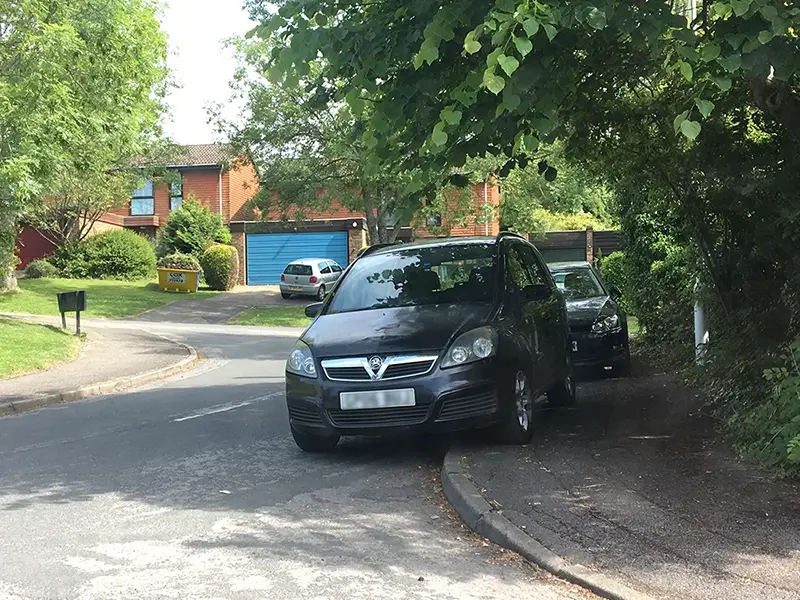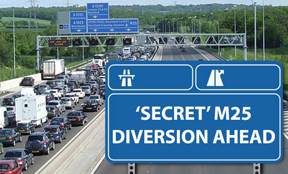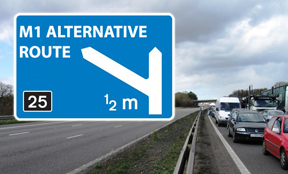Attempting to walk on paths alongside busy roads can be made treacherous by drivers who put
pedestrians in danger by parking on the pavement – but is it allowed in the UK or are you able report
such poor parking to the police?
The issue can become even worse around schools as inconsiderate parents park their cars on pathways – and
make schoolkids squeeze by them, or even risk injury by forcing them onto the carriageway
Pavement parking is also a big problem for those with disabilities, such as anyone who needs to use a
wheelchair, with car blocking pavement making it impossible for them to get by without going into the main
road.
Here motoring journalist and expert Pete Barden takes a look at the rules and what can be
done if you are blocked by a car that’s parked on the pavement.
 Parking
on pavements is dangerous and can put pedestrians at risk - but is it illegal where you are? This is
near two schools. (Credit: Pete Barden)
Parking
on pavements is dangerous and can put pedestrians at risk - but is it illegal where you are? This is
near two schools. (Credit: Pete Barden)
New pavement parking rules for 2026
Pavement parking rules are set to change across England
from 2026, giving councils new powers to crack down on cars that block footways and
create hazards for pedestrians. The aim is to make streets safer and more accessible,
particularly for wheelchair users, parents with pushchairs and people with visual
impairments.
At present, pavement parking is only automatically
illegal in London, with Scotland introducing a nationwide ban in 2023. In England, the
new approach stops short of a blanket ban. Instead, local authorities will be allowed to
introduce area-wide restrictions or targeted bans where pavement parking causes
obstruction or danger. This will make it easier for councils to act without having to
put lengthy traffic orders in place street by street.
Where bans are introduced, drivers who park on
pavements could face penalty charge notices, typically around £100, though the exact
level will be set locally. Councils are expected to consult residents before bringing in
new rules and to take account of narrow streets where pavement parking has traditionally
been used to keep roads passable.
Importantly,
pavement parking will not automatically become illegal everywhere. Drivers will need to
check local signage and markings, as enforcement will vary from one council area to
another. The changes mark a significant shift towards clearer pavements, but
responsibility will largely sit with local councils to decide how and where the rules
apply.
Is it currently illegal to park on the pavement?
The question of whether or not you can park on the pavement is not as simple as many may imagine. The
answer depends on where in the UK the parking is taking place. Here is a rundown of what rules apply
around the UK.
Pavement parking in London
Good news for pedestrians here, Londoners, on the whole, can expect the pavement to be free from drivers
putting their cars and vans on the pavement.
If drivers receive a penalty notice for pavement parking, they can expect to pay a charge from £60-130.
However, there are roads in London where parking on pavements is allowed – if for example, the street is
narrow. These will be clearly marked, so unless you see a sign allowing to park, keep off the pavements in
London.
How to report illegal pavement parking in London
If you spot a car that is illegally parked on the pavement,
then you should report it to the local council. You can find the local council here by adding the postcode of
where the car is parked.
However, if the pavement parking involves a car being parked on the pavement on zigzag lines, on a drop
kerb where pedestrians cross the road, near a school entrance, bus or tram stop, you can report these to the
Metropolitan Police here.
Pavement parking outside London
Rule 244 of the Highway Code says: You MUST NOT park partially or wholly on the pavement in London, and
should not do so elsewhere unless signs permit it. Parking on the pavement can obstruct and seriously
inconvenience pedestrians, people in wheelchairs or with visual impairments and people with prams or
pushchairs.
The difference here is that for London Rule 244 says ‘you MUST NOT’ park wholly or partially on the
pavement, but it says ‘you should not so elsewhere’.
In London, Rule 244 states you must not park on the pavement, the must indicated that there is
legislation to back-up this rule, meaning drivers could receive a fine for breaking it.
Yet, outside of London or “elsewhere”, as the wording says, Highway Code Rule 244 states drivers should
not park on the pavement, making it an is advisory that is not backed up by any legislation.
So can cars park on the pavement outside London?
It is not quite as simple as saying cars can park on the pavement outside London without fear of penalty.
Rule 242 states: You MUST NOT leave your vehicle or trailer in a dangerous position or where it causes any
unnecessary obstruction of the road.
This applies outside London as well and is backed by legislation – as it says ‘You MUST NOT’. However,
Rule 242 is not explicit what counts as a dangerous position. However, if the vehicle is parked somewhere
that is dangerous, you should take a photo – including the number plate – and report to the local police
using 101 phone number of website.
Rule 243 gives more insight into such dangerous areas that should be reported to police. It states:
DO NOT stop or park:
- near a school entrance
- anywhere you would prevent access for Emergency Services
- at or near a bus or tram stop or taxi rank
- on the approach to a level crossing/tramway crossing
- opposite or within 10 metres (32 feet) of a junction, except in an authorised parking space
- near the brow of a hill or hump bridge
- opposite a traffic island or (if this would cause an obstruction) another parked vehicle
- where you would force other traffic to enter a tram lane
- where the kerb has been lowered to help wheelchair users and powered mobility vehicles
- in front of an entrance to a property
- on a bend
- where you would obstruct cyclists’ use of cycle facilities
- except when forced to do so by stationary traffic.
These apply to both pavement parking and parking on the road.
This rule means police can penalise drivers if they decide their parking is dangerous or in any way
causes an obstruction of the road – even if it is legal to park on the pavement.
Subscribe for free motoring and travel news here - support independent journalism
Is there a pavement parking ban in Scotland?
No. There was going to be a Scotland-wide ban on pavement parking, but the ban has been delayed on
multiple occasions. Transport Secretary for Scotland Michael Matheson has scheme would be put off until
2023 because of the Covid-19 pandemic – meaning the ban is unlikely to come into force until December 2024
at the earliest.
Is there a pavement parking ban in Wales?
Wales is looking at the problem, but it seems a nationwide ban is unlikely, but local authorities and
police will be given additional powers to tackle dangerous pavement parking.
The Welsh government has stated: "The Deputy Minister for Climate Change has agreed in principle to
proceed with the additional recommendations made by the Welsh Pavement Parking Taskforce. The Welsh
Government will therefore consult on the proposal to permit local authorities to enforce the unnecessary
obstruction of the road as a parking contravention by way of civil enforcement.
"It is proposed that the police will also retain the ability to enforce the offence as a criminal
matter, as well as the new civil enforcement powers by local authorities."
Is there a pavement parking ban in Northern
Ireland?
A consultation paper set out three findings on how to deal with pavement parking in Northern Ireland.
The three options are:
- Option 1 - introduce individual bans using the Department’s existing powers.
- Option 2 – introduce an outright ban on pavement parking, possibly with some exceptions.
- Option 3 – introduce powers that would allow the Department’s Traffic Attendants to enforce against
vehicles found to be parked on the pavement and causing an obstruction.
There has not yet been a decision on implementation of these options.
Does the public understand pavement parking rules?
A survey by YouGov found there was confusion around the laws on pavement parking, with this likely making
the problem worse if drivers and pedestrians lack the knowledge required to prevent or report illegal
pavement parking.
A YouGov survey found:
- 46% of drivers are confused by the law on parking on pavements
- 41% of drivers know there is a law but didn’t know it was different in London to the rest of Great
Britain
- Only 5% of drivers know fully about the law on pavement parking
What about electric cars being charged on the
pavement?
There are no special rules allowing electric car owners to park their vehicle on pavements to make it
easier to charge. However, there have been reports of such activity with EVs parked
on pavements to charge, and this is only likely to get worse as the adoption of such cars increases.
Latest motoring news and guides
Take a look at more of our top motoring-related content here...
Subscribe for free motoring and travel news from PeteBarden.co.uk
About
us: Pete Barden Motoring and Travel News
 Parking
on pavements is dangerous and can put pedestrians at risk - but is it illegal where you are? This is
near two schools. (Credit: Pete Barden)
Parking
on pavements is dangerous and can put pedestrians at risk - but is it illegal where you are? This is
near two schools. (Credit: Pete Barden)











